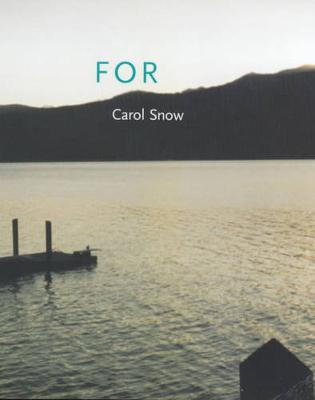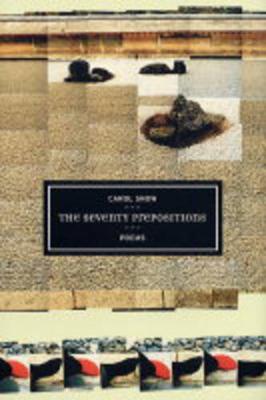New California Poetry
2 primary works
Book 1
When Carol Snow published her first volume of poetry, "Artist and Model", in 1989, poet Michael Palmer praised the "complex music [Snow] forms from our simplest words" and noted that she "reflects on the struggle toward - and limits of - representation itself..."Artist and Model" is a first book of singular poetic intelligence and attention." In "For", the first volume in the "New California Poetry" series, Snow continues her vast and original poetic project of defining the relationship among art, life, and the acts of perception that define and limit those terms. If there is "subject matter" - an elusive term when one is talking about Snow's writing - it is the play between memory and moment. Here is work that makes innovative use of autobiographical material, in finely wrought and highly sculpted poetry of great integrity, power, and subtlety.The kinship "For" has with Eastern thought and poetic forms extends to the fact that, like the poetry of Tu Fu, it has a depth charge of spare style. Among American writers, Snow's antecedents include Elizabeth Bishop and George Oppen.
For synthesizes something classical and ancient - the need to observe cleanly and to represent a thing simply and with force. Snow forges new and remarkable poetry by combining traditions that once seemed incompatible - the materials of life and a purely aesthetic, experimental style.
For synthesizes something classical and ancient - the need to observe cleanly and to represent a thing simply and with force. Snow forges new and remarkable poetry by combining traditions that once seemed incompatible - the materials of life and a purely aesthetic, experimental style.
Book 10
Carol Snow's award-winning poetry has been admired and celebrated as 'work of difficult beauty' (Robert Hass), 'ever restless, ever re-framing the frame of reference' ("Boston Review"), teaching us 'how brutally self-transforming a verbal action can be when undertaken in good faith' (Jorie Graham). In this, her third volume, Snow continues to mine the language to its most mysterious depths and to explore the possibilities its meanings and mechanics hold for definition, transformation, and emotional truth. These poems place us before, and in, language - as we stand before, and in, the world. "The Seventy Prepositions" comprises three suites of poems. The first, 'Vocabulary Sentences', reflects on words and reality by taking as a formal motif the sort of sentences used to test vocabulary skills in elementary school. The poems of the second suite, 'Vantage', gather loosely around questions of perspective and perception. The closing suite finds its inspiration in the Japanese dry-landscape gardens known as karesansui, such as the famous rock garden at Ryoan-ji Temple in Kyoto.
Here the poet approaches composition as one faces a 'miniature Zen garden', choosing and positioning words rather than stones, formally, precisely, evocatively.
Here the poet approaches composition as one faces a 'miniature Zen garden', choosing and positioning words rather than stones, formally, precisely, evocatively.

